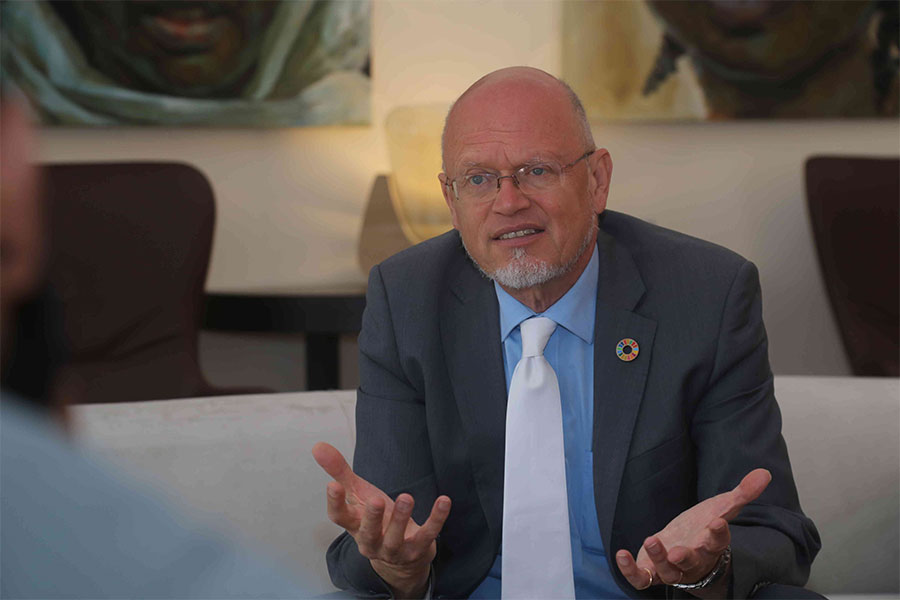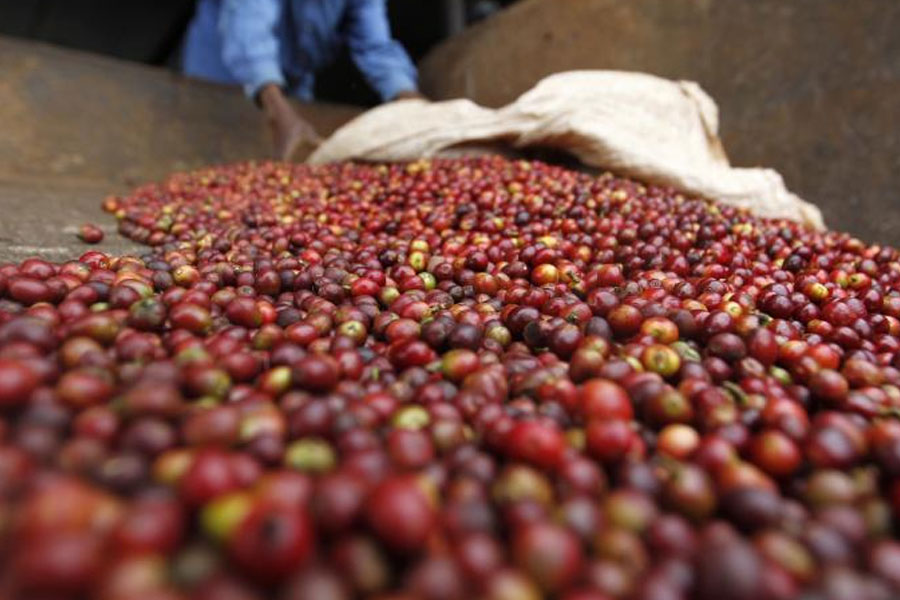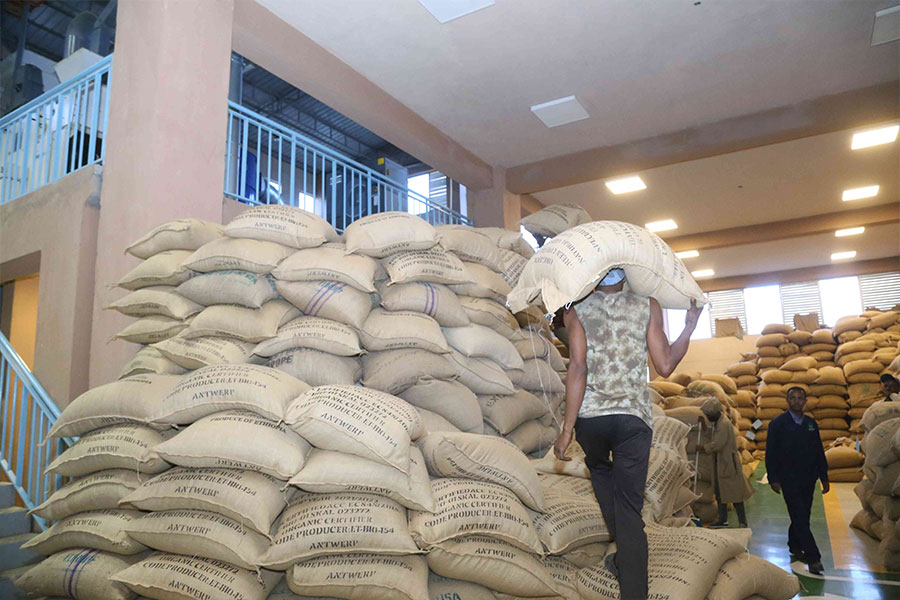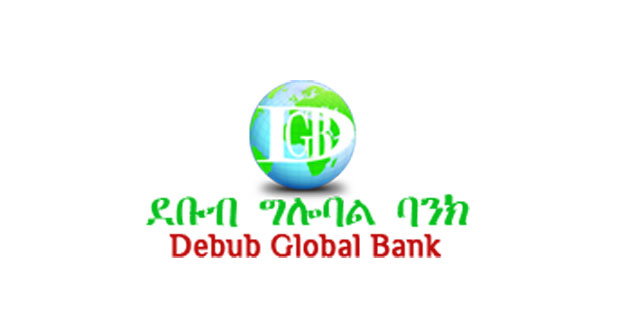
Exclusive Interviews | Apr 15,2023
Oct 28 , 2023
By Keun Lee
Coffee prices have soared in recent years, owing to unfavorable weather conditions and supply shortages in major producing countries like Brazil, India, and Vietnam. But even if consumers pay more for their daily cup, coffee farmers are seeing little gain because they lack sufficient bargaining power.
Since the 1950s, coffee has been among the world’s most-traded commodities – at one point, it ranked second, behind oil – and many governments regard it as a strategic good. But not all coffee trade is created equal.
Countries in the Global South export low-value-added unprocessed coffee – raw beans and dried and seedless coffee – with Brazil, Columbia, Vietnam, Indonesia, and Ethiopia controlling a combined market share of about 70pc. Countries in the Global North dominate exports of higher value-added processed coffee – such as roasted beans and instant coffee – with Switzerland, Germany, Italy, France, and the Netherlands accounting for 70pc of the market. The coffee sector is dominated by just three developed-country firms – Nestle, Starbucks, and JDE Peet – which account for 77.7pc of the total revenues of the sector’s 10 biggest players.
Prices of processed coffee dwarf unprocessed coffee: 14.30 dollars for a kilogram on average versus 2.40 dollars. Coffee producers in the Global South claim a small and declining share of the market’s value. Whereas in 1992, producer-country exports captured one-third of the value of the coffee market, they captured less than 10pc 30 years later. Coffee farmers get one percent or less of the final retail price of a cup of coffee, and about six percent of the price charged for a package of coffee sold to consumers in the Global North.
The obvious solution would be for coffee producers in the Global South to develop processing capabilities to increase their exports’ value-added. But there are formidable barriers to progress on this front, beginning with the high tariffs developed countries impose on processed coffee imports – 7.5pc to nine percent in the European Union (EU), 10pc to 15pc in the United States (US), and 20pc in Japan. Unprocessed coffee is not subject to tariffs.
While developing economies also impose tariffs, they tend to be more symmetric across processed and unprocessed coffee. In Brazil, both imports are subject to a 10pc tariff. While developed-country-led multilateral banks and research organisations advise developing countries to increase their exports’ value-added, developed countries’ trade policies discourage them from doing so.
Developed-country governments are unwilling to change their tariff regimes; developing countries must rely on financial incentives to counteract them. For example, they can subsidise processed coffee exports and impose export tariffs on unprocessed coffee. Malaysia did something similar with palm oil: after the United Kingdom (UK) imposed high tariffs on processed palm oil imports, Malaysia lowered taxes on processed palm oil. It introduced an export tax on crude palm oil exports.
Would-be exporters of processed coffee in the Global South also face non-tariff or technical barriers, such as sanitary and phytosanitary rules. These are, of course, entirely justifiable. Overcoming them will require the Southern exporters to invest in building technological capabilities and developing planting and processing approaches that meet international safety, environmental, and social standards.
Exporters in the Global South could even go so far as to produce and export branded coffees sold directly to North consumers. Branding and marketing is, after all, the highest value-added segment. The problem is that entry barriers in consumer markets are very high, and it takes considerable resources – and a significant risk appetite – to build up a new brand.
One way firms could circumvent some of these barriers would be to acquire existing brands. This is another lesson from Malaysia, which executed a hostile takeover of British palm oil firms on the London Stock Exchange. This kind of international acquisition has served as a useful catch-up strategy for a number of latecomers, not least China.
Producers in the Global South have another option. They can create an OPEC-style coffee “cartel,” which would have far more bargaining power on prices and tariffs against the Global North. While this solution may appear radical, it is feasible, given that the Global South’s top 10 coffee producers command nearly 90pc of the market. It is also justifiable, as the supply-side oligopoly that a cartel represents would be intended specifically to confront an existing demand-side (roaster) oligopoly.
First, however, the coffee sector in the Global South would have to be consolidated, with small firms combined through mergers and acquisitions. The new large companies could work together with public research institutions to upgrade the quality of the coffee being exported and change the value distribution. For example, the Federacion Nacional de Cafeteros de Colombia could work with the Colombian freeze-dried coffee producer Buencafe. The Malaysian Palm Oil Board could serve as a model here.
Of course, asymmetries in the global coffee market could be addressed in multilateral fora, such as the United Nations or the G20. But as long as developed countries actively impede their developing-country counterparts’ ability to make money from the coffee they produce, Southern producers have little choice but to take matters into their own hands. Tariffs and subsidies, hostile takeovers, and even the formation of a coffee cartel should all be on the table.
PUBLISHED ON
Oct 28,2023 [ VOL
24 , NO
1226]


Exclusive Interviews | Apr 15,2023

Fortune News | Sep 10,2021

Fortune News | Aug 26,2023

Commentaries | Jan 09,2021

News Analysis | Jun 01,2024

Radar | Jun 22,2024

Viewpoints | Apr 10,2021

Radar | Mar 16,2024

Fortune News | Mar 21,2020

Viewpoints | Mar 04,2023

My Opinion | 131970 Views | Aug 14,2021

My Opinion | 128359 Views | Aug 21,2021

My Opinion | 126297 Views | Sep 10,2021

My Opinion | 123912 Views | Aug 07,2021

Dec 22 , 2024 . By TIZITA SHEWAFERAW
Charged with transforming colossal state-owned enterprises into modern and competitiv...

Aug 18 , 2024 . By AKSAH ITALO
Although predictable Yonas Zerihun's job in the ride-hailing service is not immune to...

Jul 28 , 2024 . By TIZITA SHEWAFERAW
Unhabitual, perhaps too many, Samuel Gebreyohannes, 38, used to occasionally enjoy a couple of beers at breakfast. However, he recently swit...

Jul 13 , 2024 . By AKSAH ITALO
Investors who rely on tractors, trucks, and field vehicles for commuting, transporting commodities, and f...

Jul 5 , 2025
Six years ago, Ethiopia was the darling of international liberal commentators. A year...

Jun 28 , 2025
Meseret Damtie, the assertive auditor general, has never been shy about naming names...

Jun 21 , 2025
A well-worn adage says, “Budget is not destiny, but it is direction.” Examining t...

Jun 14 , 2025
Yet again, the Horn of Africa is bracing for trouble. A region already frayed by wars...

Jul 6 , 2025 . By BEZAWIT HULUAGER
The federal legislature gave Prime Minister Abiy Ahmed (PhD) what he wanted: a 1.9 tr...

Jul 6 , 2025 . By YITBAREK GETACHEW
In a city rising skyward at breakneck speed, a reckoning has arrived. Authorities in...

Jul 6 , 2025 . By NAHOM AYELE
A landmark directive from the Ministry of Finance signals a paradigm shift in the cou...

Jul 6 , 2025 . By NAHOM AYELE
Awash Bank has announced plans to establish a dedicated investment banking subsidiary...